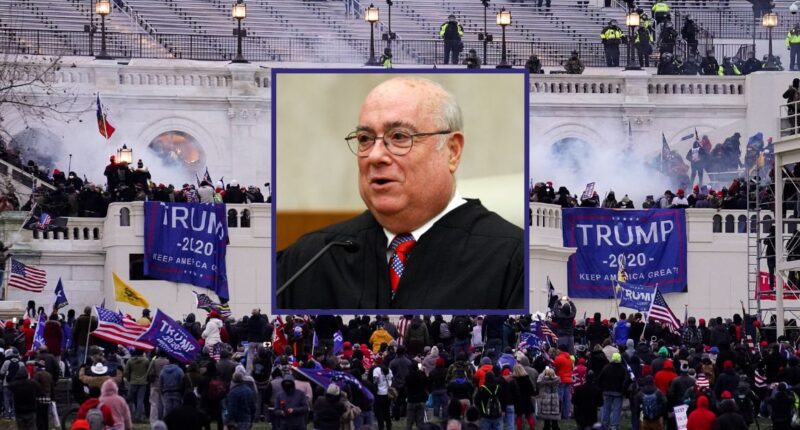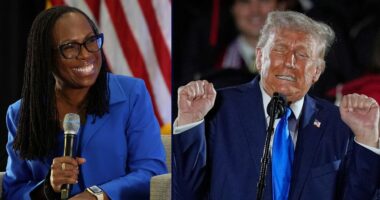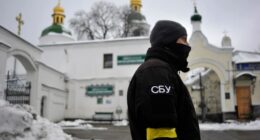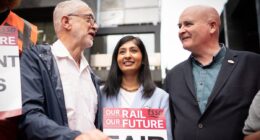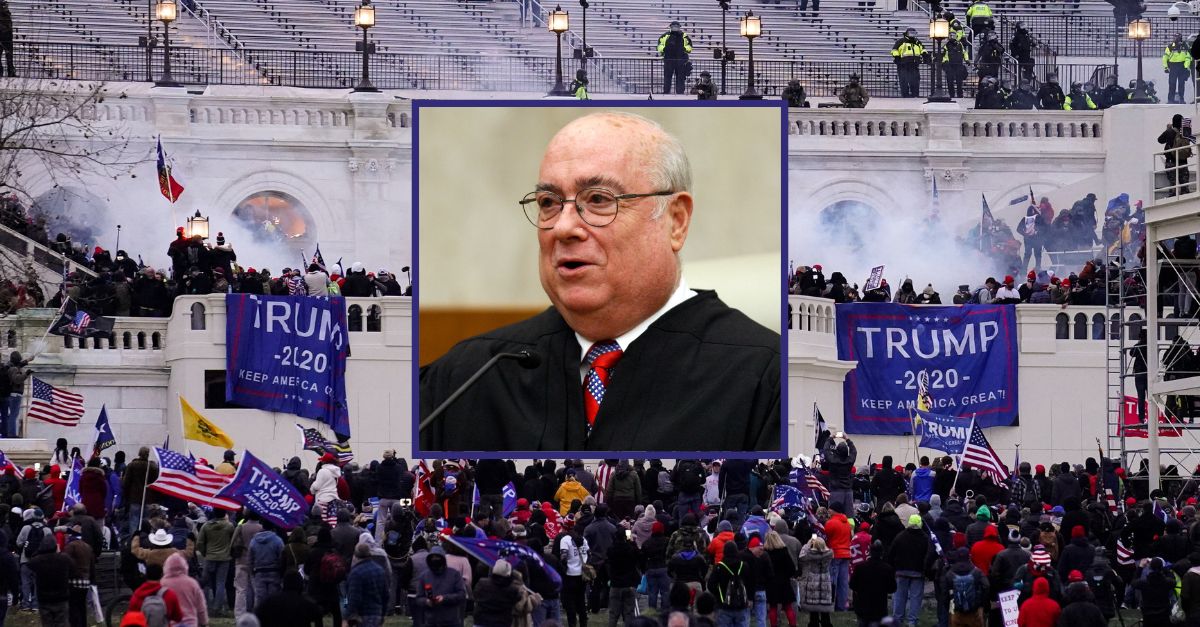
FILE — The Capitol in Washington was stormed by violent rioters loyal to President Donald Trump on Jan. 6, 2021 (AP Photo/John Minchillo, File). Inset: FILE — U.S. District Judge Royce C. Lamberth is pictured during a ceremony at the federal courthouse in Washington on May 1, 2008. (AP Photo/Charles Dharapak, File).
A federal judge who has overseen the cases of some of the most high-profile defendants accused in the Jan. 6 insurrection at the U.S. Capitol has swatted down an attempt by two defendants to delay trial in light of President-elect Donald Trump’s impending inauguration.
Senior U.S. District Judge Royce Lamberth — who once favorably compared so-called “QAnon shaman” Jacob Chansley’s oratory skills to those of Martin Luther King Jr. — took a decidedly less generous view toward defendants, Richard Slaughter and his stepson, Caden Paul Gottfried, and their request to delay their trial. In a ruling issued Wednesday, Lamberth, a Ronald Reagan appointee, swatted down the duo’s request as nothing less than “preposterous mischaracterization” of the Justice Department’s landmark prosecution of the perpetrators of the riot.
Slaughter and Gottfried were arrested in November 2022 and charged with robbery, assaulting police, civil disorder, trespassing and disorderly conduct. According to prosecutors, they were among the crowd of rioters who assaulted police officers at the tunnel on the Lower West Terrace of the Capitol, where some of the most violent incidents took place. As Lamberth notes in his order, the duo’s trial has already been delayed multiple times — first in December 2023 and then again this summer. Their trial is currently set — perhaps somewhat ironically — for Jan. 6, 2025.
Their latest attempt to avoid facing a jury came earlier this month when defense attorney William Shipley filed a motion to continue “all matters” in the case — a move not dissimilar from what multiple Jan. 6 defendants have tried, with varying degrees of success.
Lamberth, who previously bemoaned what he described as efforts to “rewrite history” regarding the violence of Jan. 6, appeared similarly dismayed by the defendants’ attempts. He first dismantled the defendants’ argument that special counsel Jack Smith’s decision to end the DOJ’s prosecution of Trump for his alleged role in fueling the fire that led to the insurrection indicated that the Justice Department had effectively taken “the official position” that the results of the presidential election “constitute[] grounds for pausing an ongoing criminal prosecution” of any Jan. 6 defendant.
“This argument stumbles right out of the gate: in the case at hand, the Government opposed the defendants’ Motion the very next day, unambiguously signaling that the Department has not, in fact, adopted an official agency policy of halting any and all matters related to the Capitol Riots,” Lamberth wrote.
The judge noted that, moreover, Smith’s allegations against Trump “bear no resemblance to the case against Mr. Slaughter and Mr. Gottfried; the fact that the former has been discontinued has no obvious significance for the latter. The Department of Justice would not be dealing unfairly or inconsistently with the defendants by proceeding with the trial as scheduled.”
Turning to the defendants’ “more substantial argument” — that they expect to be pardoned based on comments from the once-and-future president himself, and therefore a trial delay would “avoid the potentially unnecessary expenditure of the defendants’, the Government’s, and the Court’s resources,” Lamberth found that argument “unavailing.”
“This Court recently had the occasion to discuss what effect the speculative possibility of a presidential pardon has on the timetable for a pending criminal matter,” the judge wrote. “In short: little to none.”
The judge went on to explain how the separation of powers functions in relation to the potential of a grant of clemency:
The power to pardon rests in the hands of the President, but the just resolution of criminal prosecutions is the purview of the judiciary. Our constitutional scheme contemplates each actor performing its respective role in the manner it best sees fit, within the boundaries imposed by the Constitution and Congress. The defendants ask this Court to do something extraordinary: to defray the execution of its own constitutional duties ‘because of the lurking possibility of a presidential pardon after the conclusion of judicial proceedings,’ a decision by a co-equal branch of government in which this Court properly has no role. The Court declines that invitation, and will not continue this trial absent an independently compelling demonstration of good cause to do so.
“The defendants have not made such a showing,” the judge added.
Lamberth found that Slaughter and Gottfried provided “no reason to believe that this trial will be unusually burdensome or expensive.” Moreover, the judge continued, they failed to demonstrate “that the financial burden on the defendants is likely to be lessened by dragging this case out even longer than it already has.”
Lamberth was similarly unconvinced by the argument that delaying the trial would preserve DOJ resources.
“[T]he Government is well-positioned to assess its own resource constraints and priorities,” Lamberth wrote. “By opposing the defendants’ Motion, the Government has communicated its stance that proceeding to trial is not an undue burden. The Court perceives no reason to second-guess the Government’s judgment, and the defendants’ Motion suggests none.”
“The Court’s overarching duty in criminal cases is to facilitate the search for truth and dispense justice accordingly,” the judge wrote. “In so doing, the Court also serves the public interest in the efficient administration of the law. Proceeding as scheduled with this trial, which has already languished through multiple continuances for more than a year, is a worthy use of judicial resources.”
As for the defendants’ position that a denial of the delay would “likely subject the defendant to criminal convictions for no purpose other than expediency,” Lamberth’s antipathy was apparent.
“The defendants’ implicit efforts to caricature the timely pursuit of truth as a mere ‘expedien[t],’ and to recast the defendants as the hapless victims of arbitrary government action, are a preposterous mischaracterization of our justice system,” Lamberth wrote. “Courts do not simply ‘subject’ defendants to criminal convictions; people subject themselves to conviction by breaking the law, and trial is the instrument we use to decide whether they did so.”
“This Court’s duty is to uncover whether the defendants committed the unlawful things of which they are accused and, if they did, prescribe an appropriate and just punishment,” Lamberth wrote in his conclusion. “Whatever happens afterwards is irrelevant.”
